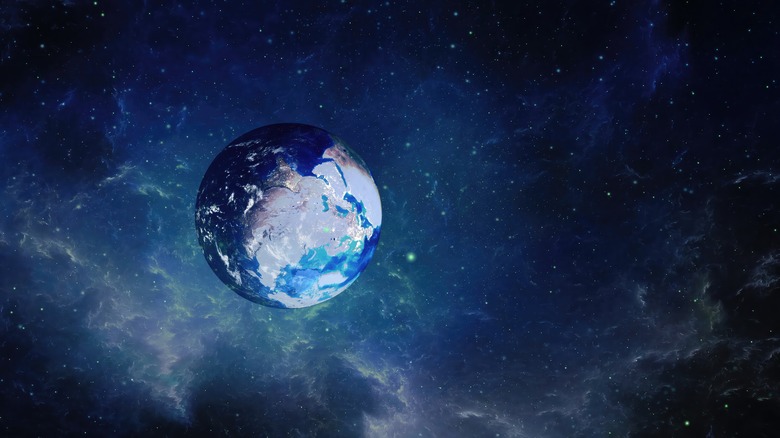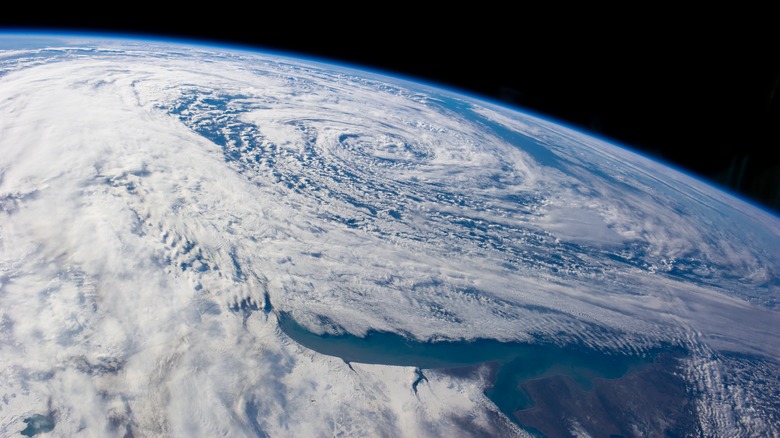If Earth Stopped Spinning, Here's What Would Happen (And It's Terrifying)
In Season 6, Episode 8 of the animated series "Futurama," a race of cat-like aliens attempts to harness the Earth's rotational energy to restore their own planet's spin. After succeeding in halting the Earth's rotation, disaster ensues: The Hawaiian Islands fold into each other, the Eiffel Tower is ripped from its foundations and flies away, and, in a satisfying display of satire from the show's writers, the set of a Hollywood disaster film is torn apart as its cast is thrown into the distance.
While the episode treats this hypothetical with hyperbole, the scene isn't as far from reality as you might think. The Earth rotates at around 1,000 mph at the equator, a figure that varies depending on where you are on the planet. In New York, for example, the Earth's rotational speed is around 800 mph; in Delhi, India, it's just about 900 mph. Wherever you are on the planet, however, if things were to suddenly come to a halt, it wouldn't look good.
As famous astrophysicist Neil deGrasse Tyson once explained in an interview on Larry King Now, "If you weren't seatbelt-buckled to the Earth, you would fall over and roll, 800 miles an hour, due east. It would kill everyone on Earth. People would be flying out of windows." So, the Earth's rotation suddenly stopping isn't an ideal scenario for humanity to continue thriving. Thankfully, scientists believe the chance of the Earth actually coming to a halt is essentially zero. But apart from people unexpectedly being launched off the ground, what effect would this actually have on the planet?
Scenario 1: The Earth stops rotating suddenly
If the Earth's rotation came to a sudden and drastic stop, the results would be catastrophic. Even though we tend to think of the planet as a material whole, much of what we associate with that totality are actually semi-independent systems floating on or above the Earth's crust. In the case of a hard stop, those systems, along with everything on the surface — the planet's oceans, its atmosphere, and all of its buildings — would keep moving east at the original rotational speed of the planet.
That means wind storms would obliterate anything in their path, raging with the force of an atomic bomb. The oceans would surge, creating colossal tsunamis that would massively affect human lives, reaching more than 17 miles inland in under a minute.
Once the Earth stops rotating, a single "day" would last a full 365 days, divided into six months of burning daylight and six months of freezing night. And, because the Earth's motion is crucial to generating its magnetic field, a stop would destabilize that protective layer, leaving the planet vulnerable to cosmic radiation and making human civilization as we know it untenable.
Scenario 2: The Earth stops rotating gradually
So, a hard stop on the Earth's rotation seems pretty bad, but how would things go if it slowed to a halt over a more extended period of time? Such a gradual stop would still have significantly dire (though less immediately violent) repercussions.
Without the centrifugal force created by the Earth's spin keeping its oceans in place, they would begin to migrate to the planet's poles, reducing the ocean's depth at the equator so much that it would expose the surface beneath it. The result of this watery movement would be the formation of two new pole-hugging oceans that cover a great deal of the northern and southern latitudes while leaving a single, giant continent of land in the planet's middle. All of this would completely disrupt existing climate and ecological systems, forcing life to reimagine how it could survive on the planet.
Thankfully, the amount of energy needed to bring the world's rotation to a stop is almost inconceivably vast, and no physical mechanism or system in humanity's possession could even come close to achieving it. So, rest assured, the world will continue to spin.


